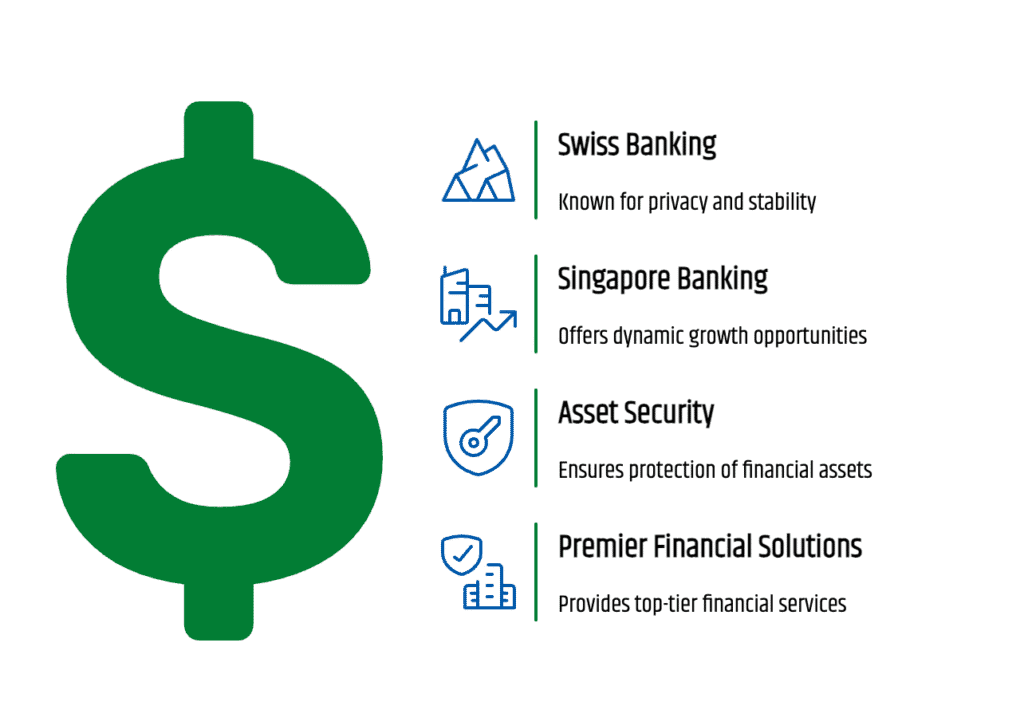The global offshore banking landscape experiences unprecedented transformation as digital-first financial hubs Singapore and Dubai challenge Switzerland’s centuries-old banking dominance. While Swiss private banks manage record-breaking assets under management of CHF 3.4 trillion in 2025, fintech innovations in Asia and the Middle East are fundamentally reshaping how international clients access financial services. This comprehensive analysis reveals whether traditional Swiss excellence can withstand the digital revolution.
The Death of Traditional Banking Barriers
Singapore and Dubai have systematically dismantled the exclusive barriers that characterized traditional offshore banking. These digital hubs now offer instant account opening, minimal fees, and sophisticated financial tools that were previously reserved for ultra-high-net-worth individuals.

Singapore leads this digital transformation with an 85% fintech adoption rate, significantly outpacing Dubai’s 70% and Switzerland’s modest 45%. This technological divide translates directly into customer experience advantages that traditional banks struggle to match.
Singapore’s Digital Banking Excellence
Singapore’s digital banking ecosystem reached new heights in 2025, with institutions like GXS Bank expanding beyond basic services to offer comprehensive investment solutions through GXS Invest. The bank now serves customers from 79 nationalities, with over 39% being women-owned businesses and 37% representing startup-phase companies.
ANEXT Bank, Singapore’s wholesale digital bank, achieved remarkable growth in 2024 with revenue surging 83.5% to S$44.9 million. Despite operational losses of S$37.2 million as the bank invests heavily in infrastructure, customer deposits grew 207% to S$906 million while loans expanded 280% to S$847 million. The bank’s recognition as “Best Digital Bank in Singapore” by The Asian Banker underscores its innovative approach to SME financing.
Key advantages include:
- Instant remote onboarding for international clients
- Daily interest crediting on multi-currency accounts
- AI-powered risk assessment enabling faster loan approvals
- Embedded finance solutions integrated with digital platforms
Dubai’s Fintech Revolution
Dubai’s banking transformation accelerates through the UAE’s ambitious cashless strategy, targeting 90% digital transactions by 2026. Wio Bank exemplifies this evolution, offering business accounts with AED 99-249 monthly fees and comprehensive digital tools including invoice management and real-time cash flow analytics.
The UAE’s digital banking market, valued at USD 3.16 billion in 2024, expects to reach USD 5.71 billion by 2029 at a CAGR of 12.56%. This growth stems from progressive regulations in the Dubai International Financial Centre (DIFC) that embrace both traditional and digital banking models.
Dubai’s competitive advantages:
- No personal income tax for most non-residents
- Progressive digital asset regulation in the DIFC
- Instant multi-currency accounts with global payment capabilities
- Lifestyle integration through banking apps connected to travel and shopping services

The Swiss Banking Counteroffensive
Switzerland’s banking sector demonstrates remarkable resilience despite digital challenges. Swiss private banks achieved their highest-ever assets under management of CHF 3.4 trillion in 2025, driven by positive market performance and steady net new money inflows of CHF 72 billion.
However, fundamental changes reshape the Swiss landscape. The number of private banks continues declining from 85 at the start of 2024 to fewer than 80 expected by end-2025. Major consolidation includes Safra Sarasin’s acquisition of Saxo Bank, the largest private banking transaction in a decade.
UBS Post-Credit Suisse Integration
UBS’s acquisition of Credit Suisse fundamentally alters Swiss banking dynamics. The integrated entity now faces additional regulatory capital requirements of USD 24 billion beyond the previously announced USD 18 billion, totaling USD 42 billion in extra capital requirements. Despite these challenges, UBS maintains its target of 15% return on CET1 capital by 2026.
The acquisition eliminates a major Swiss competitor while creating a banking giant that dominates domestic and international markets. However, UBS continues resolving Credit Suisse legacy issues, including recent settlements of USD 300 million for mortgage-backed securities and USD 511 million for US tax probe matters.
Swiss Innovation Response
Swiss banks increasingly adopt digital solutions, though progress remains gradual. New entrants like Alpian democratize private banking by reducing minimum entry requirements from CHF 1 million to CHF 2,000, while maintaining Swiss regulatory standards. This hybrid approach combines human expertise with digital tools, offering more competitive fees and accessible investment solutions.
Traditional Swiss advantages persist:
- Unparalleled global investment access including private equity, hedge funds, and exclusive deals
- Sophisticated estate planning for multigenerational wealth
- Political and economic stability backed by strong institutions
- Privacy protections within legal compliance frameworks
Comprehensive Banking Comparison Analysis
| Feature | Swiss Private Banks | Singapore Digital Banks | Dubai Digital Banks |
|---|---|---|---|
| Minimum Deposit | $1M+ USD (Private Banking) | $0-350k SGD (Private: $750k) | $0 (Business: AED 99-249/month) |
| Monthly Fees | 50-100 CHF | $0-10 SGD | AED 99-249 |
| Account Opening Speed | 2-8 weeks | Minutes to days | Minutes to days |
| Digital Maturity Score | 6.5/10 | 9.2/10 | 8.8/10 |
| Private Banking Threshold | $1M USD minimum | $350k-750k SGD | No private banking tier |
| Multi-Currency Support | Excellent (20+ currencies) | Strong (10+ major currencies) | Strong (Multi-currency accounts) |
| Remote Onboarding | Limited (in-person preferred) | Full remote capability | Instant digital onboarding |
| AI-Powered Features | Basic | Advanced (AI chatbots, analytics) | Advanced (lifestyle integration) |
| Digital Asset Support | Conservative approach | Progressive (regulated crypto) | Progressive (DIFC crypto-friendly) |
| Annual Management Fees | $10,000-20,000+ CHF | $1,000-5,000 SGD | $500-2,000 USD |
| Investment Products | Extensive global access | Growing, Asia-focused | Limited but growing |
| Regulatory Framework | FINMA regulated | MAS regulated | UAE Central Bank + DIFC |
Cost and Speed Efficiency Analysis

The data reveals striking differences in banking efficiency. Digital banks in Singapore and Dubai process account openings within hours compared to Swiss banks requiring weeks. Annual fees show even more dramatic disparities, with digital banks charging $250-300 annually versus Swiss private banking fees exceeding $15,000.
Entry Barriers and Accessibility
| Banking Option | Minimum Deposit | Target Market |
|---|---|---|
| Swiss Private Banking | $1M+ USD | Ultra-high-net-worth individuals |
| Singapore Private Banking | $350k-750k SGD | High-net-worth professionals |
| Singapore Digital Banks | $0 | SMEs, entrepreneurs, millennials |
| Dubai Digital Banks | $0 | Businesses, freelancers, expats |
| Swiss Retail Banking | $3,500 CHF | General banking needs |
Investment Access and Wealth Management
Switzerland maintains superiority in sophisticated wealth management and global investment access. Swiss private banks offer comprehensive portfolios spanning alternative investments, structured products, and exclusive opportunities unavailable through digital platforms.
Singapore’s wealth management sector grows rapidly, with private banking minimums ranging from S$350,000 to S$750,000, significantly lower than Swiss requirements. Singapore banks provide direct exposure to Asia’s growth markets including China, India, and Southeast Asian economies.
Dubai’s investment offerings remain limited but expanding, with progressive digital asset regulations attracting cryptocurrency-focused wealth managers. The DIFC’s regulatory framework enables innovative financial products while maintaining international compliance standards.
Regulatory Frameworks and Compliance
Switzerland operates under FINMA regulation with stringent requirements for banking licenses requiring CHF 10 million minimum capital. The simplified banking regime (SBR) reduces compliance costs for smaller institutions, though most major banks maintain full regulatory infrastructure.
Singapore leverages MAS regulation known for innovation-friendly policies combined with robust oversight. The digital bank licensing framework enables rapid market entry while ensuring systemic stability. Singapore’s implementation of revised Payment Services Act in 2024 expanded permissible activities while strengthening consumer protection.
Dubai benefits from dual regulatory systems through UAE Central Bank and specialized authorities like DIFC. This structure accommodates both traditional banking and fintech innovation, creating competitive advantages for digital service providers.
Future Outlook and Strategic Implications
The banking landscape converges toward hybrid models combining traditional expertise with digital efficiency. Swiss banks accelerate digital transformation while maintaining core wealth management advantages. Meanwhile, Singapore and Dubai digital banks expand investment capabilities and wealth management services.
Winning Strategies by Client Profile:
Entrepreneurs and SMEs: Singapore and Dubai digital banks offer optimal solutions with instant onboarding, low fees, and integrated business tools.
High-Net-Worth Individuals ($1M+): Swiss private banks remain superior for comprehensive wealth management, though Singapore provides compelling alternatives for Asia-focused investors.
Digital Asset Investors: Singapore and Dubai lead with progressive regulations and innovative custody solutions.
Global Business Operations: Hybrid approach using digital banks for operational efficiency while maintaining Swiss relationships for sophisticated wealth planning.
Conclusion: The New Banking Reality
The offshore banking landscape no longer requires choosing between traditional Swiss excellence and digital innovation. We recommend a diversified approach to maximize financial advantages.
Singapore leads the digital transformation with superior fintech adoption and Asian market access—perfect for entrepreneurs and Asia-focused investors. Dubai excels in business banking efficiency and progressive digital asset regulations. Switzerland remains unrivaled in comprehensive wealth management, global investment access, and multigenerational planning for ultra-high-net-worth clients.
At Easy Global Banking, we guide high-net-worth individuals through every step of accessing Swiss private banks or Singapore’s innovative wealth management services. Leveraging our deep relationships and in-market expertise, we ensure seamless onboarding, compliance, and optimal banking structures tailored to your objectives.
By combining each jurisdiction’s unique strengths, we deliver operational efficiency through digital innovation alongside the sophisticated wealth management that only traditional banking can offer.





